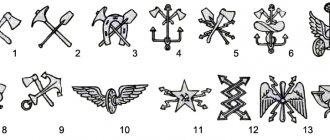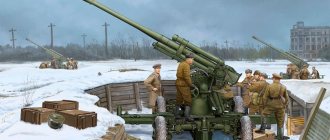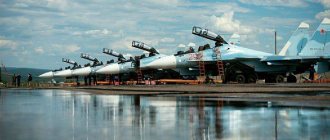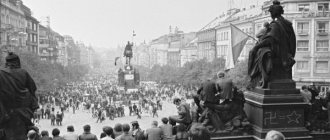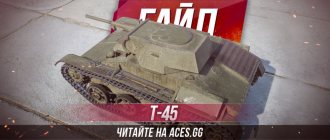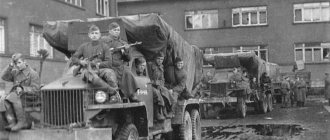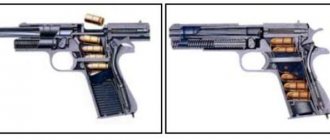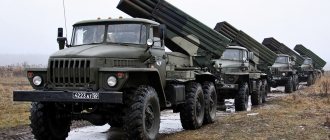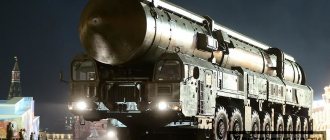The Prague Spring of 1968 and its subsequent suppression had a great influence on the public consciousness of the inhabitants of Eastern Europe. These events were acutely felt not only by politicians and intellectuals, but also by ordinary citizens, who felt that the future of the country depended on their actions. Despite the success of the Soviet side, which achieved its goals and preserved the socialist regime in Czechoslovakia, the suppression of the Prague Spring had a negative impact on the integrity of the socialist camp and the viability of the communist regime in Europe.
Background
The Cold War gave birth to two military-political blocs opposing each other. In 1949, NATO emerged, and in 1955 - the Warsaw Treaty Organization (WTO) - an alliance of socialist countries led by the USSR.
The 1960s were a turning point for the United States and Europe. The ideas of freedom, pacifism and the need to renew the world were in the air. New trends also penetrated into Czechoslovakia. They fell on fertile ground: Czechoslovakia at that time was experiencing an internal crisis. The command economy was unable to meet the needs of the population, and many were concerned about the limitation of sovereignty and the violation of civil liberties. At the end of 1967, the conservative Antonin Novotny was replaced as first secretary of the Central Committee of the Communist Party of Czechoslovakia by the liberal-minded Alexander Dubcek, who proposed his own reform program. It is worth emphasizing that, despite the progressiveness of Dubcek’s ideas, all his innovations fit within the framework of the socialist system and did not affect its very essence. The "Program of Action" that the Czechoslovak government began to implement in 1968 included:
- weakening censorship in the media, providing freedom of speech;
- federalization of the state and granting political rights to the subjects of Czechoslovakia;
- freedom of movement;
- introduction of elements of a market system into a planned economy;
- rehabilitation of victims of political repression;
- development of public organizations more or less free from party control.
However, the Soviet leadership was very concerned about these innovations. Leonid Brezhnev and his associates feared that democratization in Czechoslovakia would provoke similar processes in other socialist countries and, ultimately, lead to the collapse of the socialist camp. Until August 1968, Prague and Moscow constantly communicated on the topic of reforms. There was a popular opinion in the leadership of the USSR that even if Dubcek himself was not ready to destroy the socialist system, this process could be launched from below and the first secretary would have to give in to the demands of the people.
The final decision to send troops to Czechoslovakia was made on August 16 at a meeting of the leaders of the participating countries of the Warsaw Warsaw War. The official wording stated that the force operation would be carried out at the request of a group of political figures of Czechoslovakia (in Czechoslovakia there was indeed a conservative-Stalinist opposition that opposed Dubcek). The operation was codenamed "Danube", and military leadership was entrusted to General Ivan Pavlovsky.
"Socialism with a human face"
Already in April 1968, Dubcek assembled a whole team that was preparing to carry out sweeping reforms:
- Oldřich Chernik. The head of government, an experienced politician, but known for his connections with local dissidents.
- Ota Chic. Deputy Prime Minister. It was he who became the main author of the model of Czechoslovak “market socialism” in the economy, which was never implemented. He called it the “third model,” distinguished from capitalism and Soviet socialism.
- Josef Smrkovsky. Head of the National Assembly. Like Dubcek, he was a supporter of expanding the autonomy of Slovakia.
- Joseph Pavel. Minister of Internal Affairs. In 1951, he was subjected to repression and was sentenced to 25 years in prison, but in 1955 Pavel was released.
Prague during the invasion of the Warsaw Pact troops.
August 21, 1968 / meduza.io By the spring of 1968, reformers had weakened censorship and began developing a multi-party state system. Political and public organizations began to be created in the country, the most famous of which was “Club-231” (an article of the Criminal Code under which dissidents were often arrested).
National security agencies were to be subject to strict controls to prevent possible illegal arrests. The democratization of the country began, and a “Program of Action” was developed, which was based on “ideological pluralism.”
Soon it was planned to carry out federalization, which raised the national question, so unloved by the communists of the USSR. In the summer of 1968, “religious liberalization” began, and the Slovak Greek Catholic Church, banned in 1950, was revived. It was on July 15, 1968 that Dubcek first uttered the legendary words:
“to carry out such a policy so that socialism does not lose its human face.”
Meanwhile, the head of the national security service, William Shalgovich, by order of the USSR, began preparing a coup d'etat.
A. Dubcek - left in the front row, Ludvik Svoboda (center) and Nicolae Ceausescu (right) during a visit to Czechoslovakia, 1968
Operation Danube (20-21 August)
The next three days were spent on military training. The day before, one of the Soviet generals had informally warned Dubcek about the invasion, while simultaneously warning against armed resistance.
On the night of August 20-21, the armed forces of the USSR, Hungary, Bulgaria and the GDR, totaling about 300 thousand people, crossed the border of Czechoslovakia from four directions. At the same time, Soviet military aircraft landed at the Ruzyne airfield in Prague. Troops of the countries participating in the Warsaw Warsaw Warsaw Forces entered all major cities and took control of the most important institutions: city and regional administrations; government buildings; arsenals; buildings from which radio broadcasting was carried out; publishing houses; post offices. The leadership of the Communist Party of Czechoslovakia, including Dubcek, was arrested and transported to Moscow.
The Czechoslovak army, in accordance with the previously issued decree, remained in the barracks without offering any resistance. Moscow's next step was to create a loyal government, however, a problem arose with this: even conservative forces did not want to put up with the invasion of their country by foreign troops. Citizens of Czechoslovakia also actively opposed the introduction of troops. People learned about what was happening thanks to underground radio stations and leaflets. Barricades were erected on the streets, swastikas were painted on Soviet tanks, citizens shouted anti-Soviet slogans and put up posters with corresponding content. The most radical ones threw Molotov cocktails at tanks and damaged military equipment. Unfortunately, these clashes were not without casualties. According to various estimates, over 100 citizens of Czechoslovakia and 11 Soviet soldiers were killed, and there were many wounded on both sides.
On August 21, a group of countries led by the United States brought the Czechoslovak issue to the UN Security Council for consideration, demanding the immediate withdrawal of Warsaw troops. Unexpectedly for the Department of Internal Affairs, this position was also supported by some socialist countries - China, Yugoslavia, Albania and Romania. Under this pressure, the USSR had to complete the active phase of Operation Danube (which lasted 36 hours). During negotiations that took place on August 23-27, the USSR and Czechoslovakia signed the Moscow Protocol. The document stated that the Internal Affairs Troops would be withdrawn after the situation normalized in Czechoslovakia. In effect, this meant that the Soviet protectorate would exist indefinitely. Some troops did leave Czechoslovakia by November, however, Soviet armed forces remained there until 1991.
The beginning of Operation Danube - the end of brotherly friendship
August is one of the most significant months in history, especially in the turbulent 20th century. In this month, with chronological accuracy, significant events occur that influence the subsequent course of history, changing the destinies of peoples. In 1968, the month of August was no exception. In the dead of night on August 21, 1968, one of the largest military operations since 1945, codenamed “Danube,” began in Europe.
The scene of action was the Central European state of the Czechoslovak Socialist Republic, which until that moment had been one of the main pillars of the socialist camp. As a result of the invasion by troops of the Warsaw Pact countries, Czechoslovakia found itself under occupation. The Prague Spring, a revolutionary period in the country's history, was suppressed through the use of brute military force. All reforms carried out in the country that were revolutionary in nature were curtailed. The military intervention in Czechoslovakia became a serious crack that split the unity of the socialist camp.
It cannot be said that the socialist front was united in this impulse. Protest and disagreement with the methods being pursued were expressed by those countries that tried to pursue a balanced foreign policy, distancing themselves from the excessive tutelage of the USSR. Romania, Yugoslavia and Albania opposed the entry of troops from the Warsaw Warsaw armies into Czechoslovakia. After these events, the leadership of Albania generally set a course towards secession from the membership of the Warsaw Pact Organization.
From a technical point of view, Operation Danube can be considered a model of tactical and strategic planning. The territory of the country was occupied by large military contingents in just three days. Even taking into account the fact that the invasion forces did not encounter organized resistance from the Czechoslovak People's Army, losses during such a large-scale operation were extremely small. Soviet units participating in Operation Danube lost 36 people killed and wounded, excluding non-combat losses. The occupation of Czechoslovakia was not so peaceful for the civilian population. 108 people became victims of direct armed clashes with the occupation forces, and more than half a thousand were injured.
In this case, it was not without provocation. In addition to the fact that troops ready for invasion were concentrated on the borders of Czechoslovakia, the start of the operation had to be carried out secretly and covertly. At the airport of the Czechoslovak capital, a Soviet passenger plane made an emergency landing at night, from the cabin of which, to the surprise of the airfield service personnel, armed paratroopers began to disembark. After the capture group captured all the main hubs and control points of the airport, Soviet transport planes began to land on the runway one after another. Soviet transport planes loaded with military equipment and troops arrived every 30 seconds. From that moment on, the fate of the Prague Spring was sealed.
At the same time, after receiving a signal about the successful start of the operation, Soviet troops, army units of the National People's Army of Germany, units and mechanized units of the Polish Army, the People's Army of Bulgaria and Hungary invaded the territory of Czechoslovakia. The invasion was carried out from three directions. Columns of the NPA and the Polish Army were coming from the North. From the East, through Transcarpathia, Soviet troops invaded the territory of Czechoslovakia. The troops of the Hungarian People's Army and parts of the Bulgarian army advanced from the southern flank. Thus, the “rebel republic” was engulfed in dense steel pincers.
It is important to note that at the very last moment the army units of the German Democratic Republic were withdrawn from participating in the invasion. The Soviet leadership did not want to have an analogy with the Wehrmacht invasion of Czechoslovakia in 1938. German troops were ordered to stop at the border, being in constant combat readiness. Polish, Hungarian and Bulgarian units performed an auxiliary function, controlling the peripheral regions of the country and the section of the border between Czechoslovakia and Austria. The main tasks during Operation Danube were carried out by Soviet troops, which were brought together into two fronts - the Carpathian and Central. The total number of Soviet troops involved in the invasion was about 200 thousand soldiers and officers.
In tactical terms, the Soviet Union allocated large forces to participate in Operation Danube. A total of 18 Soviet divisions took part in the operation, including tank, airborne and motorized rifle divisions. From the air, the troops had serious air support. There were 22 regiments of helicopter and aviation units of front-line aviation alone. The number of Soviet tanks was unprecedented, approximately 5,000 vehicles used for the operation! The total number of army units and units of the armed forces of the countries that took part in Operation Danube was about half a million people.
The motive that guided the leaders of the countries that took part in the invasion is interesting. The Prague Spring was declared an attempt by counter-revolutionary forces to take revenge, the purpose of which was to eliminate the socialist gains of the Czechoslovak people. In this regard, the USSR and other countries of the socialist camp are forced to come to the aid of the people of fraternal Czechoslovakia in defending their gains.
Results
The leadership of Czechoslovakia returned to their homeland, however, the signing of the Moscow Protocol had a negative impact on Dubcek’s further political career. All the achievements of the Prague Spring were eliminated. Czechoslovakia came under even tighter control from the USSR, and power passed into the hands of conservatives. At the same time, the Soviet intelligentsia reacted violently to the Czechoslovak events: during these years there was a growth in the dissident movement throughout the socialist camp.
The introduction of troops into Czechoslovakia provoked the flight of democratically minded citizens from the country. Since the Communist Party of Human Rights blamed the Jews for the August events, mass deportations took place in many socialist countries, and anti-Semitic sentiments intensified.
Reasons for the transition to liberalization policies
The situation that developed as a result of the establishment of the communist regime after the end of World War II, the one-party system, and the ossification of the political system required a global restructuring .
Back in the spring of 1953, after the death of I.V. Stalin and the President of the Czechoslovak Socialist Republic K. Gottwald, A. Zapotocki .
Significant increases in prices for essential goods and food, and the lifting of restrictions on product consumption caused by the financial reform of 1953, caused unrest in Pilsen and other industrial areas. Citizens expressed dissatisfaction with the policy of penalties for leaving the workplace. The government's actions were limited to increasing the production of consumer goods and stopping accelerated measures to collectivize peasants. In May 1956, demonstrations took over Prague . This time, students took part in them, demanding the abolition of supervision over intellectual activity and cultural life.
In the fall of 1957, A. Novotny , who subsequently pursued a policy of de-Stalinization, exposing the cult of personality, arresting adherents of Stalinism and restoring victims of repression. Thus, the first steps were taken towards moving away from conservatism.
In addition to the above, the reasons for the start of the “Prague Spring” include:
- The planned economy and the low pace of its development.
- Late rehabilitation of victims of repression.
- Separation in the rights of Czechs and Slovaks.
- Ossification of political leadership (conservative forces).
- Reform within the command-administrative system.
- Strict control of party structures.
Suppression of the Prague Spring: an eternal dispute of 50 years
August 21 marks the 50th anniversary of the entry of Soviet troops and formations of other Warsaw Pact countries into Czechoslovakia. The suppression of the Prague Spring became a symbolic event that still negatively affects Russia's relations with the Czech Republic and Slovakia. Was it worth sending in troops, or do the actions of the allied leadership look wrong?
The events of August 21, 1968 were preceded by a series of changes that were called an attempt by the leadership of Czechoslovakia to build “socialism with a human face.” The Prague Spring began with economic reforms. Then it came to a change in the country's leadership - the leader of the communist reformers, the head of the Communist Party of Slovakia, Alexander Dubcek, . Finally, this was followed by the weakening of censorship and the democratization of public life.
Gradually, radical criticism of the very foundations of socialism began to emerge. A club of active non-partisans declared itself. The theaters staged productions by the then young playwright Václav Havel , who exposed the socialist system. Western “voices” also contributed to the development of events: the Czech service of Radio Liberty, television and radio in neighboring Germany and Austria. There was also a small armed underground. However, Western propaganda was carried out on fertile ground: the reforms met with widespread support in different sectors of society.
What was happening already in March 1968 caused alarm in other socialist countries. Walter Ulbricht and Wladyslaw Gomulka , were the first to advocate a forceful solution to the issue . They were soon joined by the leader of Bulgaria, Todor Zhivkov . Until the last moment, the Soviet Union tried to resolve the issue through negotiations, and only by August it leaned towards the military option. Until recently, the head of Hungary, János Kádár , did not want a forceful scenario, but in the end he, too, joined in the suppression of the Prague Spring.
On the night of August 20-21, a force operation began, in which 18 Soviet divisions and two divisions each from Poland, Hungary, and Bulgaria took part. The participation of the GDR turned out to be more limited. Officially, this was done at the request of the pro-Soviet minority in the leadership of the Czechoslovak Communist Party, which signed the corresponding letter. During the street protests, as was long believed, 72 citizens of Czechoslovakia, 13 Soviet military personnel and 13 military personnel from other ATS countries were killed. Recently the figure has been 127 dead. Several hundred people were injured.
The introduction of troops inside the socialist camp was condemned only by the leader of Yugoslavia and Romania, Josip Broz Tito and Nicolae Ceausescu . Western countries limited themselves to verbal condemnation, but did not take any active action. Czechoslovak leaders were taken to Moscow, where they were forced to abandon almost all reforms. Gustav Husak, came to power for a long 21 years . The leaders of the Prague Spring and active dissidents were either removed from office, imprisoned, or forced to emigrate.
The events of 1968 gradually became surrounded by legends, becoming a kind of guiding star for opponents of the Soviet Union and socialism. When socialism fell in Czechoslovakia as a result of the Velvet Revolution of 1989, active participants in the Prague Spring came to power. The events of 1968 were declared a heroic uprising against totalitarianism. Relations with the USSR (and then with Russia) cooled sharply, and no apology or repentance from the Soviet and Russian leadership helped for a long time.
Estimates of what happened 50 years ago in our country remain very different. Some are inclined to view the suppression of the “Prague Spring” as a bloody crime of the Soviet regime, and are ready to repent to the Czechs and Slovaks, it seems, forever. Others, on the contrary, completely justify the actions of the USSR, believing that it defended its interests and prevented NATO’s early advance to the east. It seems that in both cases we are talking about extremes. The truth lies somewhere in the middle.
The Soviet Union indeed had reasons for concern. It was the USSR that personified socialism, and without its participation the communists would not have lasted long in power either in Czechoslovakia, or in Poland, or in Hungary, or in the GDR. Given the realities of the Cold War, the collapse of the socialist camp would mean the disappearance of the “security belt” along the western borders of the Soviet Union. And since the foundations of the socialist system with the leading role of the Communist Party and a planned economy were the same, the attempt on them was perceived as a blow to the USSR.
Supporters of forceful actions point out that at that time it was a question of an attempt at a “color revolution.” Indeed, many opponents of socialism were associated with emigrant centers (for example, Vaclav Havel, some of whose relatives lived abroad) and the intelligence services of Western states. Foreign “voices” talked a lot about the shortcomings of socialism, sometimes deliberately exaggerating them. Radical anti-Soviet activists, sometimes armed, made themselves known more and more actively. In general, there are enough similarities with the Maidans of later times...
And there seemed to be nothing to complain about. The store shelves were full. Czechoslovakia was a fully developed country that exported cars, electric locomotives, trams and trolleybuses, and machine tools. It was one of the thirty most developed in the world, and in terms of living standards in the socialist camp it was second only to the GDR. It had a stable sales market in the USSR and other socialist countries. And besides the Communist Party, there were four more parties operating in the country. It seems that there could be no reason for dissatisfaction - the situation could only be heated up from the outside...
However, everything is learned by comparison... And the Czechs had someone to compare themselves with. Residents of the GDR had the example of Germany nearby, and residents of Soviet Estonia had the example of Finland. In the case of Czechoslovakia, the yardstick was neighboring Austria, with which many Czechs and Slovaks had consanguineous ties. The “Iron Curtain” and the visa regime certainly prevented contacts, but it was easier for Czechs and Slovaks to get to Vienna than for residents of the Soviet Union to get to “semi-socialist” Yugoslavia.
Once in Austria, the Czechs and Slovaks saw the following picture. The country with which they were not so long ago on the same level was moving forward. It had a larger selection of consumer goods, better roads, and greater incomes. The Czechoslovak industry often worked using outdated technologies, while the Austrian industry was much more responsive to the demands of progress. Moreover, in Austria there was no leading force in the form of the Communist Party, and people were punished much less often for an “alternative” point of view...
A large part of Czechoslovakia was covered by Austrian television, and in those days knowledge of the German language was almost universal. And as the socialist economy began to falter (and by the mid-1960s, reforms were overdue), capitalist states began to seem something like an earthly paradise. Germany and Austria were consistently among the 15 most developed countries, which certainly hurt the Czechs and Slovaks. They, who did not have any global projects, simply wanted to live as well and satisfyingly as their neighbors.
Rigid Soviet-style socialism also did not meet with understanding in Czech society. Democratic traditions were quite strong in the country. In the 1930s, Czechoslovakia remained the only country in Central and Eastern Europe that did not slide into dictatorship. The communists in the country were strong, but a significant part of them preferred parliamentary struggle rather than barricades. And they often voted for them because, unlike the “bourgeois” parties, they had nothing to do with the loss of statehood in 1938-1939.
After World War II, Czechs and Slovaks were grateful to the Red Army for liberating the country from the Nazis and their minions. However, talking about mass Russophilia in Czechoslovakia would be overkill. Czechs and Slovaks for the most part, of course, were not Russophobes, but Russia and the USSR were always something distant for them. But they lived side by side with the Germans for centuries, and France or Holland were understandable to them. They considered themselves Europeans, and perceived the Iron Curtain on their border as something unpleasant and temporary.
In addition, Czechoslovakia as a state existed for a relatively short time - only 50 years (with a break for the war). The country still had fresh wounds from the Munich Agreement of 1938 and the Nazi occupation. These traumas were also compounded by the communists coming to power with the help of the USSR. Czechs and Slovaks wanted to determine for themselves how they should live. Therefore, the appearance of foreign tanks and interference in their internal structure was perceived extremely painfully by the Czechs and Slovaks.
Of course, there were those who welcomed the invasion. However, there were such a minority in the Czech Republic, and in Slovakia, and among the common people, and among the communists, and even in the country’s leadership. In the first days after the entry of troops, the country was overwhelmed by mass demonstrations of protest against foreign intervention. On the fences, people wrote not the most pleasant words about the USSR, and the hockey match between the USSR and Czechoslovakia in the spring of 1969 resulted in an anti-Soviet demonstration. Soon they managed to stop, but the dissatisfied murmur did not go away.
Today, the events of 1968 are also perceived through the prism of further developments. And it was unfavorable for the communist leadership. After a short economic recovery, a new economic crisis set in by the end of the 1970s, which only worsened. Meanwhile, Germany and Austria, along with other Western countries, were moving forward. Of course, there was no talk of poverty or shortages of essential goods in Czechoslovakia, the country objectively lived well, but everything was learned by comparison...
The rule of Gustav Husak (who himself went through prison) was not cruel. Dubcek was exiled to the forestry enterprise, young economists Vaclav Klaus and Milos Zeman were not imprisoned either - they were simply denied the opportunity for career growth. Writer Milan Kundera and director Milos Forman were released from the country, and they gained worldwide fame. The playwright Havel was imprisoned several times, but not for long. He was not even prohibited from receiving fees for staging his plays abroad. Czechoslovak “totalitarianism” clearly did not fit into the Gulag.
However, even targeted repressions, coupled with the lack of freedom of speech and the impossibility of publicly criticizing the authorities, led to an increase in discontent. Many Czechs and Slovaks considered the Soviet Union, colloquially referred to as “Russia,” to be to blame for what was happening. And therefore, when socialism collapsed, the turn to the West and the sharp curtailment of ties with the “East” did not cause discontent in Czech and Slovak society. They will only learn in the 21st century that membership in the EU and NATO also has its costs.
The perception of those events in the two successor states of Czechoslovakia is not entirely the same. Since Slovakia then received the long-awaited federalization, and considerable funds were allocated for its development under socialism, they perceive the affairs of those days less acutely. However, even in Slovakia, a rare politician can afford to justify the deployment of Soviet and other troops - such a statement would mean inevitable political death. In the Czech Republic, no one allows this - even the communists try to avoid the topic.
The fact that opposition to the introduction of troops in 1968 has firmly become part of the Czech and Slovak self-awareness is also evidenced by the sharp reaction of the authorities of the two states to their coverage in the Russian media. As soon as an article appeared in 2017, where the actions of the USSR were justified, Czech President Milos Zeman, at a meeting with Dmitry Medvedev, demanded an explanation. In Prague and Bratislava, Russian ambassadors were summoned to the Foreign Ministries. The same picture was observed in 2013. So 1968 is not completely a thing of the past.
Nevertheless, attitudes towards Russia among Czechs and Slovaks are slowly changing for the better. Polls show that in Slovakia there are slightly more people who are sympathetic towards Russia than there are ill-wishers. In the Czech Republic, the picture is worse: over a third speak of a bad attitude towards Russia, and barely a fifth speak of sympathy. Over the past four years, the figures have understandably deteriorated slightly again. Although 25 years ago the situation was completely hopeless. Therefore, these figures are unpleasant, but not catastrophic.
The reason for this is not only that “time heals,” and that the actions of the USSR are gradually becoming on a par with how Great Britain and France once gave Czechoslovakia to be torn to pieces by Hitler. The Czechs and Slovaks have already paid for NATO membership in blood, having suffered losses in Afghanistan and Iraq. Unlike the United States, the USSR did not force its allies to fight in Afghanistan. Like the Soviet Union before, the Americans also wanted to place their own facility in the Czech Republic - a missile defense system radar. But the Czech people were against...
Membership in the European Union, as it turns out, is also not an earthly paradise. The Czech Republic and Slovakia stubbornly resist accepting refugees, although according to all treaties they are obliged to accept them. They are forced to coordinate almost more steps with Brussels than with the USSR 50 years ago. The EU interferes in their internal affairs no less than the Soviet Union - except that it is not introducing tanks yet. So the further, the more the suppression of the “Prague Spring” is replaced by other, more topical and pressing events.
Nevertheless, as long as the leadership of the Czech Republic and Slovakia remains living witnesses to the suppression of the “Prague Spring” and the subsequent 20 years of socialism, the shadow of Soviet tanks will continually influence the relations of these countries with Russia. Was the introduction of troops into Czechoslovakia and the retention of socialism for another 20 years worth the deterioration of relations towards us among broad sections of the two Slavic peoples? Of course, after time the costs are visible much better, but still this seems rather like a mistake. Despite the fact that there was a certain logic in the actions of the USSR.
Vadim Trukhachev , candidate of historical sciences
Prague Spring 1968
Socialism in Czechoslovakia, from its very appearance in the late 40s, took root ambiguously.
Klement Gottwald
Back in 1948, active attempts were made to revive bourgeois rule in a country that was just beginning to recover from the consequences of the war and fascist occupation. However, Klement Gottwald, with the active support of the Soviet leadership and the Red Army, which at that time captured all of Central Europe (according to the official version, this sounded like liberation from fascism), was able to resist bourgeois trends in his country. By hook or by crook, he won the presidential elections that year and became the first “red” president of Czechoslovakia.
Would you support sending troops into Czechoslovakia?
NOT REALLY
One of those who actively supported him was the war hero, the Czechoslovak general, who would eventually hold the posts of Minister of Defense and President of the country - Ludwik Svoboda. But, later, seeing Gottwald’s harsh rule and the repressions similar to Stalin’s that began in the country, Svoboda (in accordance with his surname) will find himself in opposition to the new ruler and fall into disgrace. The war hero was stripped of all honors and dismissed from the army. But, after Gottwald’s death, justice prevailed and the most famous Czechoslovak general of the Second World War was again in service. After this, Ludwik Svoboda held various high government positions.
Ludwik Svoboda
On March 30, 1968, Svoboda was elected president of the Czechoslovak Socialist Republic. This was the time when the new leadership of the country, inspired by the “Khrushchev thaw” in the USSR, tried to carry out extensive democratization of Czechoslovak society, starting the construction of the so-called. "socialism with a human face." This became possible thanks to the fact that Alexander Dubcek, a man of broad views, stood at the party helm of the country. Not the least role was played by the future dissident, and then the president of Czechoslovakia and the Czech Republic, Vaclav Havel.
Expert opinion
Konstantin Pavlovich Vetrov
Assistant and Advisor to the Minister of State Control of the USSR, Hero of Socialist Labor, historian, Doctor of Historical Sciences. Author of many scientific works on the history of the Soviet Union.
By supporting the line of the Czechoslovak government, L. Svoboda created a monolith in the desire for reforms in the country. All of Czechoslovakia looked at these changes with hope and faith in the future, but they were not destined to come true.
Deployment of troops and the end of the “Prague Spring”
On August 20, 1968, the troops prepared to invade the country received a special signal - “Vltava-666”. This happened at 22:15, and 45 minutes later a combat alert was announced in the military formations. The deployment of troops took place from 18 places in the adjacent territory of the USSR, the GDR, and also Poland and Hungary. Due to the fact that in addition to the Soviet troops, the combined contingent included military formations of the above-mentioned countries and Bulgaria, the impression was created of a joint action of the countries participating in the Warsaw Pact to provide “assistance” to Czechoslovakia in the fight against anti-socialist elements. In fact, this was an outright military intervention on the part of the Soviet Union, designed to further maintain control over Czechoslovakia, preventing it from leaving the socialist “family.”
Tank on the street of Prague
This is exactly how the actions of the troops were perceived in Czechoslovakia itself. People who 20 years ago were grateful to Soviet soldiers for their liberation from fascist occupation now sent curses at them, comparing them with the same fascists.
Expert opinion
Konstantin Pavlovich Vetrov
Assistant and Advisor to the Minister of State Control of the USSR, Hero of Socialist Labor, historian, Doctor of Historical Sciences. Author of many scientific works on the history of the Soviet Union.
And this was not far from the truth, because there was little difference between the events of 1938 and 1968. The only thing that was the same was that in both the first and second cases, the Czechoslovak armed forces did not offer any resistance to the stronger enemy.
results
The result of the actions was the death of more than 200 people on both sides of the conflict, most of whom were civilian Czechoslovak citizens who tried to protect their country from the intervention. A. Dubcek was removed from the leadership of the party, and his place was taken by Gustav Husak, who was more loyal to instructions from Moscow. Ludwik Svoboda continued to be the country's president, but only for a short time and formally. Czechoslovak reforms were curtailed and they had to wait until the “Velvet Revolution” of 1989.
Soviet troops on the streets of Prague
A Soviet military contingent, called the Central Group of Forces (CGV), was left on the territory of Czechoslovakia for more than 20 years. The relationship between the Czechs and Russians for many years became quite cold and even hostile, especially on the part of the former. This was noticeably evident during meetings between the hockey teams of the two countries.
